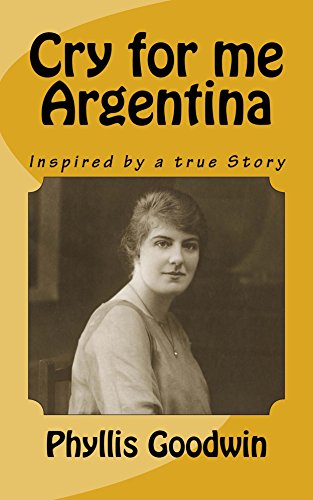Ordinary people living through extraordinary times–an English couple in Argentina before the rise of Peron
Historical fiction. 353 pages, $4.90 on Kindle
Debut novelist Phyllis Goodwin’s sweeping tale of two ordinary young English people who meet and marry in Argentina between the wars, and all the history that swept around them as they built their simple lives together, accomplishes the most important thing a story can do, in my humble opinion, and that is to move the reader to care about those characters and their story. As the revelations of the final pages fell into place, I found my throat choking up as unpretentious and non-heroic human souls faced truth and responded with courage and humanity. I will not spoil the journey for the reader, but thank the writer for the gift of sharing that journey.
The book could use a good scrubbing by a tough love editor, for sins of punctuation, telling-not-showing, inclusion of extraneous details, point of view shifts and oddly telescoping time shifts within single paragraphs.
And yet, even with all these technical flaws freely admitted, there is much to enjoy and value in this story. Without the story ever bogging down into a history lesson, the reader absorbs much of the rising tension of that time period as the world convulsed not once but twice in world wars, and then once more the reader experiences the tension of the rise of the Peron movement after WWII through the main characters in Argentina. The author’s feel for setting was rich and nuanced; I too love jacarandas, their color and their scent, and have chickens and dream of a duck pond. The characters are individual and unique and memorable, their motivations clear and sharp. Perhaps there are too many lesser side characters cluttering the main narrative, and a sharper editing knife would pare a dozen away, but even the smallest walk-on part seemed to reflect a real individual, not a type, and to echo a variation on an experience in the main characters’ lives in some way. Perhaps all those side characters and meanderings through unrelated stories are not so extraneous after all. The naturalistic style of the narrative, while frustrating at times as it insistently dwelt in details that seemed to take the reader away from the main current of the story, enhanced the sense of real people and real place that is a major strength of this work.
Recommended: for historical fiction readers interested in the role the English played in Argentina in the first half of the twentieth century. I would not consider it a historical romance in the classic genre sense of the term, although the main characters’ clean romance and married relationship is real and believable.
I received a free copy of this work in exchange for a fair and impartial review.
